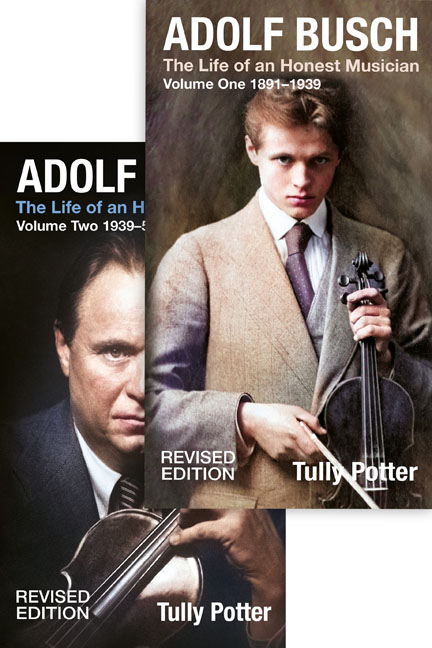Book contents
- Frontmatter
- Contents
- Illustrations
- Dedication
- Introduction
- Acknowledgements
- I The Busch Family
- II The Prodigy
- III The Cologne Conservatory
- IV The Young Virtuoso
- V The Vienna Years
- VI Berlin and Busoni
- VII The Darmstadt Days
- VIII Burgeoning in Basel
- IX The Break
- X Busch the Man
- XI The Chamber Players
- XII The Lucerne Festival
- Volume Two: 1939–52
- XIII The New World
- XIV Between Two Continents
- XV The Marlboro School of Music
- Appendices
- Envoi: Erik Chisholm talks about Adolf Busch
- Select Bibliography
- Index to Discography
- Index of Busch’s Compositions
- General Index
- Index to Adolf Busch’s Compositions on Record
- Index to Discography
- Frontmatter
- Contents
- Illustrations
- Dedication
- Introduction
- Acknowledgements
- I The Busch Family
- II The Prodigy
- III The Cologne Conservatory
- IV The Young Virtuoso
- V The Vienna Years
- VI Berlin and Busoni
- VII The Darmstadt Days
- VIII Burgeoning in Basel
- IX The Break
- X Busch the Man
- XI The Chamber Players
- XII The Lucerne Festival
- Volume Two: 1939–52
- XIII The New World
- XIV Between Two Continents
- XV The Marlboro School of Music
- Appendices
- Envoi: Erik Chisholm talks about Adolf Busch
- Select Bibliography
- Index to Discography
- Index of Busch’s Compositions
- General Index
- Index to Adolf Busch’s Compositions on Record
- Index to Discography
Summary
The Harz holiday caused Busch to miss his elder brother's opening performances as General Music Director of the Saxon State Opera – the season started on 13 August 1922 with Fidelio; then came Der Rosenkavalier, Die Meistersinger and Tristan. On 26 August the Adolf Busches, Rudi Serkin and Otto Grüters attended the dress rehearsal of Die Zauberflöte. Fritz was in his element, having captured perhaps the most desirable operatic job in Germany, held previously by Weber and Wagner. A post in Berlin might carry more glamour, through association with the capital, but in Dresden the director had an orchestra as fine as any in the world (Fritz compared it to a Stradivarius) and a cohesive company full of fine singers:
Fate had placed me in Dresden in a situation in which all the essentials – nature, art and good traditions – were united as is seldom the case. The outward appearance of the Opera House raised the highest expectations. The building, Semper's work, was a jewel of beauty. The general aspect of the town which it dominated, together with the Hofkirche so imaginatively designed, the Zwinger, the Elbe and the Brühl Terrace in the near distance, was unparalleled.
Hans Gál concurred:
Dresden was incomparable as a musical centre. The orchestra had the same virtues as the Vienna Philharmonic – all its members were recruited from the local conservatoire. At the time of Busch the Opera was excellent. Not in vain Strauss had all his first performances there’.
During his tenure, with the backing of the sympathetic Intendant Alfred Reucker, Fritz established an artistic policy which was the envy of the world and raised the State Opera to its artistic zenith, only to see lesser men such as Karl Böhm and Karl Elmendorff reap the benefit of his labours. Three Busch brothers forged strong links with the Saxon capital: Fritz as its leading resident musician, Adolf as visiting soloist and composer, Herman as principal cellist of the city's second orchestra, the Philharmonic. In his first season alone, Fritz gave (in addition to the operas already mentioned) Otello, Boris Godunov, Palestrina (with Pfitzner present) and Arlecchino (with Busoni in attendance). He also took over the twelve subscription concerts of the Sächsische Staatskapelle, with conspicuous success.
- Type
- Chapter
- Information
- Adolf BuschThe Life of an Honest Musician, pp. 321 - 392Publisher: Boydell & BrewerPrint publication year: 2024



